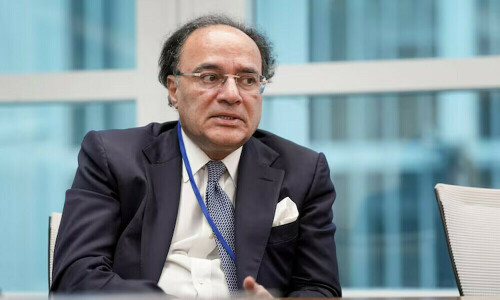Finance Minister Advocates for Population as Key NFC Award Criterion
Finance Minister Muhammad Aurangzeb has emphasized the importance of considering population size as a primary factor when allocating resources under the National Finance Commission (NFC) Award.
The minister articulated this viewpoint during an event hosted by the Ministry of National Health Services, Regulations, and Coordination in Islamabad, commemorating World Population Day.
He echoed the sentiments of the Health and Planning Ministers, recommending that broader human development indicators should be used to ensure fair distribution of funds between the federal and provincial governments.
Understanding the NFC Award
The NFC Award is Pakistan’s system for distributing financial resources between the central government and its provinces, established by Article 160 of the Constitution. It uses a formula to allocate taxes and other revenues.
Call for Redirected Development Financing
Senator Aurangzeb also urged a revised approach to how donors and development finance are engaged.
He noted that while infrastructure projects have historically received the bulk of international funding, there’s now a crucial need to channel these resources toward improving human capital, particularly in areas like healthcare, education, and population management.
Concerns Over Population Growth and its Impact
“To achieve our ambition of becoming a $3 trillion economy by 2047, we must address the critical issues of climate change and population growth,” Aurangzeb stated.
Aurangzeb highlighted Pakistan’s population growth rate of 2.55%, pointing out the significant challenges it poses for national advancement, financial planning, and societal welfare.
“A staggering 40% of Pakistani children under five years old experience stunted growth,” he revealed.
Aurangzeb cautioned that the nation’s future leadership is already at risk. He underscored that tackling stunting and learning deficiencies demands a comprehensive strategy that incorporates nutrition, hygiene, access to clean water, family planning, and increased awareness. These issues were extensively discussed by experts at the event.
Aurangzeb added that a significant portion of the population, particularly women, still lack basic literacy.
“Women constitute at least half of our population; their active participation in the workforce is essential for the country’s sustainable progress,” he asserted.
Unified Approach to National Budgeting
He advocated for a fundamental change in how the national budget is approached. Instead of separate federal and provincial budgets, he suggested a unified, nationwide approach to development spending.
Referencing this year’s federal development budget of Rs1 trillion, and the combined federal and provincial budget of Rs4.2 trillion, he argued that the primary challenge lies not in the availability of funds, but in allocating and prioritizing them effectively.
He mentioned Pakistan’s 10-year Country Partnership Framework with the World Bank, noting that four of its six pillars are focused on population and climate-related concerns. He announced that approximately one-third of the total funding—nearly $20 billion over a decade, or about $600–700 million annually—will be earmarked for population-related initiatives.
He stressed that these funds should be used strategically, moving beyond superficial measures like tax breaks on contraceptives to ensure meaningful investments across the board.



Comments (0)
No comments yet. Be the first to comment!
Leave a Comment